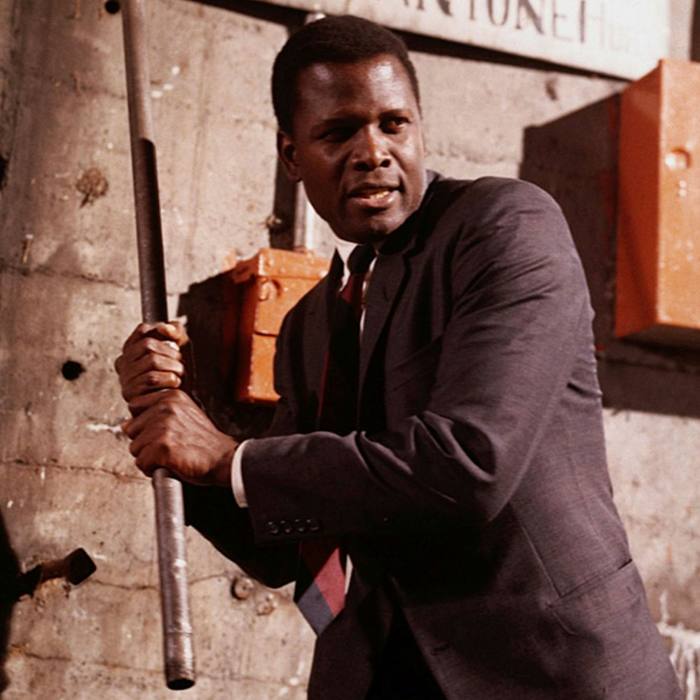Sidney Poitier’s career was a turning point in Hollywood history: the elevation to leading-man status of an actor from a race previously consigned to near-oblivion on western screens.
Before Poitier, who has died aged 94, black performers had largely played supporting roles or caricatural ones (like the actor whose name became synonymous with comic servility, Stepin Fetchit). Poitier brought humanity and dignity, a vivid naturalism as well as film-star good looks. Early movies such as No Way Out and Blackboard Jungle announced a newcomer combining sex appeal with a special blend of reticence and intensity. The emotions Poitier seemed to keep dormant on screen, whether playing a convict on the run in The Defiant Ones or a racially abused cop in In the Heat of the Night, were as compelling as those he gave vent to.
It was hardly his fault that being a black role model on screen ended up threatening to turn him into a two-dimensional icon: the kind of ethnic paradigm from which he had rescued American cinema in the first place, though in his case the image was more saintly than servile. Poitier’s role as an eligible bachelor doctor in the race-relations morality drama Guess Who’s Coming to Dinner (1967) was derided by many critics as the reductio ad absurdum. The character was so tanked up with virtues, so filled with high-octane special pleading, that he became less a human being than a one-man ambassador for black America.


This was particularly unfair given that Poitier had become involved in the civil rights movement at some risk to himself. In summer 1964, he accompanied musician Harry Belafonte to deliver $70,000 to activists in Greenwood, Mississippi; on arrival, they were chased while driving by the Ku Klux Klan.
The actor’s career and life story were remarkable. Seventy-five years before receiving a lifetime achievement Oscar in the historic 2002 ceremony where for the first time African-American performers won both Best Actor and Best Actress awards in the same year (Denzel Washington, Halle Berry), Sidney Poitier came into the world in Miami, Florida. Born on February 20, 1927, during a visit to the US by his Bahamian parents, he was the son of a tomato-growing farmer. Raised on Cat Island in the Bahamas, Poitier returned to Miami at age 15 to live with his brother (and, it was said, to iron out delinquent tendencies). Moving to New York not long afterwards, he did menial jobs, slept in a bus station, worked in an army veterans’ hospital.
His interest in acting began, and almost ended, when he auditioned for the American Negro Theatre. Rejected for his thick accent, Poitier spent months trying to eliminate it, finally returning for a successful reaudition. He won a bit part on Broadway in Lysistrata, then his first proper screen role as a young doctor opposite Richard Widmark in No Way Out (1950). A prominent role in The Blackboard Jungle (1955) as a high school student (at age 28!) turned him into a star. He won an Oscar nomination in the jailbreak drama The Defiant Ones (1958) and the Oscar itself — the first Best Actor statuette ever awarded to a black performer — for Lilies of the Field (1963).
That sentimental tale of racial harmony, in which Poitier builds a chapel for a band of German nuns, hinted at the dangers ahead. Cynics began to deride Poitier as Hollywood’s token one-man gesture to concord between races. He was cast in ultra-virtuous roles in 1965’s A Patch of Blue and two 1967 films, Guess Who’s Coming to Dinner and To Sir, With Love. (Poitier starred in To Sir, With Love’s 1996 made-for-TV sequel, which was directed by Peter Bogdanovich, who died on Thursday.)


He varied the diet with variable genre films (The Bedford Incident, The Slender Thread, Duel at Diablo) and from the 1970s he directed a ragbag of medium-budget movies while largely withdrawing from acting. These ranged from a western (Buck and the Preacher) via a weepie (A Warm December) to a series of popular though critically scorned Blaxploitation comedies. His best directing effort, Stir Crazy (1980), owed less to Poitier than to the comic chemistry of stars Richard Pryor and Gene Wilder.
His return to acting in the late 1980s — Little Nikita, Sneakers — was less Indian summer, more lukewarm December. By then, however, it hardly mattered. Poitier was already an icon of Hollywood history and a career model for black stars such as Washington, who acknowledged, both off and on the Academy Awards stage, that Poitier had shown the way.
In 1974 he received an honorary knighthood from Queen Elizabeth II. In 1980 he wrote his first autobiography, This Life. In 1997 he was appointed the Bahamian ambassador to Japan. Twice married, to Juanita Hardy (in 1950) and actress Joanna Shimkus (1976), he leaves six children.
Stay connected with us on social media platform for instant update click here to join our Twitter, & Facebook
We are now on Telegram. Click here to join our channel (@TechiUpdate) and stay updated with the latest Technology headlines.
For all the latest Art-Culture News Click Here
